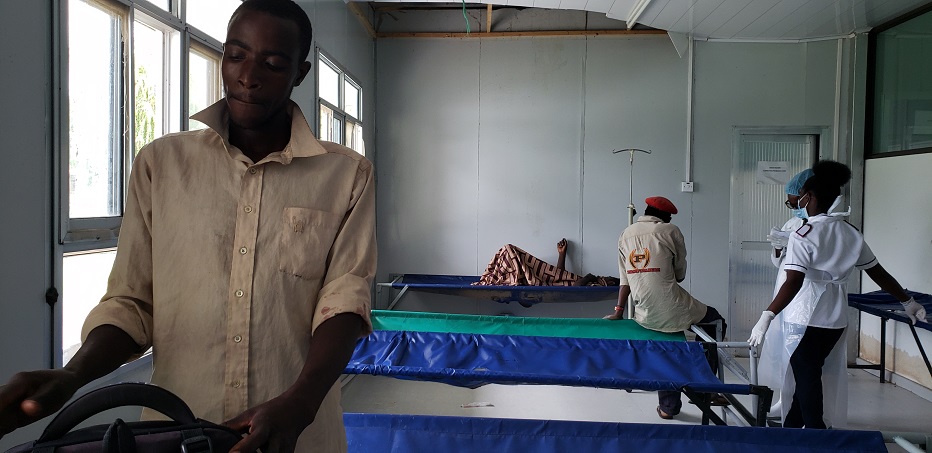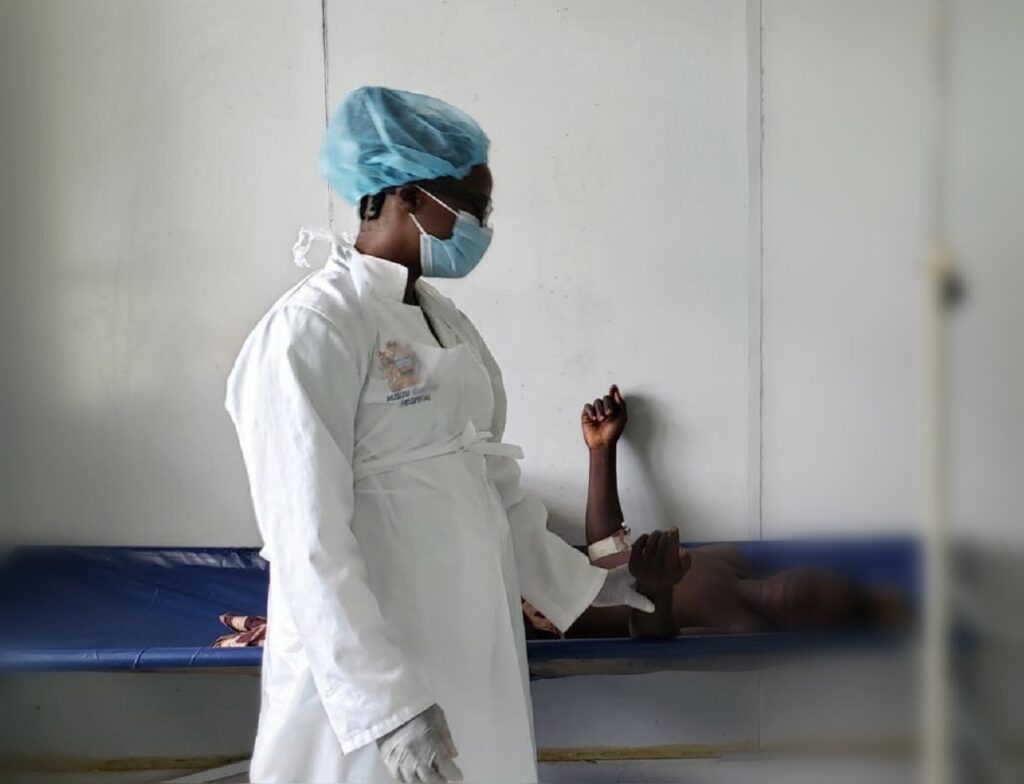By Tiwonge Kampondeni

Karonga, April 2 Mana: A 26-year-old Chawanangwa Simfukwe from Mpata in the area of Paramount Chief Kyungu in Karonga was on January 11, 2023, admitted to Karonga District Hospital, becoming one of two cholera patients registered in the district on that day.
There were 589 new cases and 892 patients admitted to health facilities, with 17 deaths on that day alone across the country.
Nationally, the country has registered 22,759 cases and 750 deaths since the outbreak began in March of the previous year.
Although Simfukwe was discharged the following day, he was still haunted by the experience.
“I came here yesterday at noon. I was so weak, my legs hurt and I had a running tummy. I couldn’t control it. I thought I was going to die, however I started feeling much better a few hours later after I was given intravenous (IV) fluids and,” Simfukwe says while packing his belongings into a black backpack after being certified fit to go home.
Despite sharing his fears, Simfukwe’s face flushes with excitement at the good news that he goes back home alive.
Hilariously he speculates how he might have gotten the Cholera infection.
“I have been forgetting to wash my hands after using the toilet (nkhaluwanga kugeza mmawoko pala nawerako ku chimbuzi). I have been eating vimbala (food leftovers from the previous day). I have also been drinking untreated water from Towo River.
“But these are the things I have been doing all my life and I never got sick. Why should I get cholera now?” Simfukwe wonders as he continues packing his language.
To him, it is strange that he has to change his lifestyle by drinking treated water, and wash hands after using the toilet, besides observing all personal hygiene practices as advised upon being discharged from the health facility.
“They are saying that I have to change. So, I don’t have to eat chimbala chizizimu (cold food leftovers). I don’t understand but I am told it is an outbreak,” giggles Simfukwe as he carries on with the conservation while placing a reused 2-litre bottle filled with diluted oral rehydration salt (ORS) which he got from the hospital into his backpack.
As he leaves, Simfukwe sympathetically walks towards 21-year-old from Katili from the same area, Phyoka Msiska, another cholera patient in the ward to wish him a quick recovery.
Msiska sat on his bed while leaning on a wall on his back but could hardly speak as he was still so weak and disoriented.
“I know that I am in the hospital but I don’t remember how and when I came here,” he says as he wobbly retreats into a supine-like sleeping position to allow the stool he couldn’t control pass through a hole on his bed into a bucket placed under it.

A Clinical Technician at the hospital, Mercy Kalambo, one of the nurses attending to cholera patients explains that all Cholera patients at the hospital are treated at the Emergency Treatment Unit which is isolated the main hospital’s buildings.
Kalambo observes that most cholera patients go to the hospital with severe dehydration and that the health workers’ priority is on stabilizing their conditions.
“We had to put Simfukwe and Msiska on intravenous therapy. When they improved, we switched to ORS. We also made sure that people who were in contact with them at home and as they were being taken to the hospital take precaution measures against the disease,” says Kalambo.
She says that she is pleased that almost 99 percent of the patients recover though in some cases, the facility receives reinfection cases.
“We had a patient who was treated and was discharged only to return a few days later after falling very sick,” Kalambo said.
For Simfukwe and Msiska, theirs is a sad story with a good ending as they both fully recovered. Most communities in this lakeshore district use water from unsafe sources. Many also don’t have toilets and compromise on hygiene and sanitation practices.
According to World Health Organisations (WHO), 26,000 cases and 660 deaths have been reported as of 29 January, 2023 in 10 African countries facing Cholera outbreaks since the beginning of the year.
Malawi is the hardest hit with cholera cases registered in all the 28 districts.
During an ESAR RCCE Media Dialogue – Africa’s Cholera Outbreak: What Journalists Need to Know webinar, heard in February, Public Health Expert Dr. Otim Patrick Ramadan, WHO Regional (Africa) Epidemiologist based at WHO Emergency Hub in Nairobi said for Malawi, it is a combination of different factors that resulted into the outbreak.
Ramadan cites last year’s flooding due to Tropical Cyclone Anna, Covid- 19 which resulted in severe economic situations, misinformation and myths as some of the triggers to the spread of the outbreak.
“The cyclone which happened in January 2022 damaged water supply system for and sanitation infrastructure in the southern part of the country where the outbreak was first reported.
“This contaminated water sources, pit latrines were flooded and the fecal mixed water was carried around so it really increased the risk for a Cholera outbreak,” said Ramadan.
He says that the implication of COVID-19 on Malawi’s economy left the country with less capacity to effectively respond to cholera by conducting mass vaccination when the outbreak emerged.
He adds that misinformation and myths also amplified the spread of the disease as people developed fear of the unknown and did not go for Chorela vaccination.
An environmentalist and President of Association for Environmental Journalists (AEJ) in Malawi, Mathews Malata points out the linkage between poor hygiene and sanitation and waste management which he said have created a conducive environment for the spread of the outbreak.
“If we have indiscreet disposal of waste, what that means is that some of it goes into the soil, polluting the soil. It can also lead to contamination of groundwater and if you are drinking groundwater that is contaminated you are at risk of getting infected,” Malata says.
Director of Chisomo Youth Organization which is based in Karonga, Davie Kitalu says the organization has taken an initiative in creating community awareness of the need for keeping their surroundings clean.
Kitalu’s concern is that waste management remains an environmental challenge in this lakeshore district.
Waste is disposed of anyhow and most uncollected garbage finds its way into the lake and other water sources after getting washed away by rain water.
“We have been cleaning Karonga Market, collecting waste from the streets. We hope communities will to take care of their surroundings as demonstrated,” Kitalu says.
Traditional Authority Kalonga laments how democracy is making it hard to engage communities on emerging health related issues.
“There was a time, when a community member challenged me that he can’t be forced to construct a toilet for his household. He told me that if I want him to construct the toilet I should pay him,” Kalonga said.
Civic Education Expert for National Initiative for Civic Education (NICE) Trust responsible for Karonga-Chitipa, Mabvuto Mkandawire is certain that a number of things that Malawi is grappling with including the outbreak requires mindset change.
“Mindset change is Malawi 2063 first enabler. If only people would ensure that they have toilets, use clean water, and get vaccinated, cholera would be a thing of the past. A number of people in Karonga haven’t gone for Cholera vaccination because they feel it’s not important. Some have their own beliefs,” says Mkandawire.
Among the initiatives, Karonga District Council led by the district’s health office has been involved in various campaigns, against the spread of the disease and distributed of chlorine for water treatment.
While Karonga and other districts have made progress in reducing Cholera cases, there are fears that the recent flooding and infrastructure destruction due to Tropical Cyclone Freddy could be a breeding ground for more cases.

